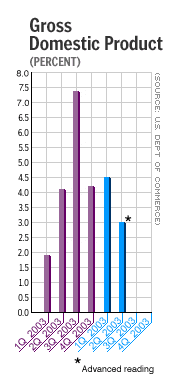NEW YORK (CNN/Money) -
Though flush with cash, U.S. businesses aren't providing quite the lift to the economy analysts once hoped, meaning the recent so-so pace of the expansion could continue for a while longer.
And if the cautious business spending continues, that could be a sign of more weakness in the job market ahead.
Consumer spending is always the real driver of the economy, making up more than two-thirds of all economic growth. But business behavior is important, too -- even more so now that interest rates are slowly rising, the stimulative effects of last year's tax breaks have worn off, and consumers could use a confidence-boosting hiring boom.
In recent years, consumer resilience in the face of terror attacks, a bear market in stocks, corporate scandals, two wars and other nightmares not only steered the economy from real disaster but pushed it to stronger-than-average growth last year.
The slowdown in business spending after the bursting of the tech-stock bubble in 2000 helped set the stage for a recession, and economists have hoped businesses would keep the economy growing at a better-than-average pace this year, picking up the torch from consumers.
But even though they've added some 1.25 million jobs to private payrolls this year and increased their investment at a reasonable pace, they're still not hiring and spending the way they have in previous economic recoveries, economists said.
"The rate of spending is less than you would have expected given the typical business cycle," said John Silvia, chief economist at Wachovia Securities. "Companies have made a lot of money, but if you look at equipment and software spending, this cycle is below the pace of the past three or four cycles."

"We're left with the story that companies are keeping more cash on hand than is typical in a business cycle," he added. "What will they spend it on, if anything?"
Certainly, companies always need to buy stuff to keep up with the Corporate Joneses, finding new ways to boost productivity and profit. A new survey of 300 executives at large companies by consulting firm Accenture (ACN: Research, Estimates), formerly known as Andersen Consulting, found 55 percent plan to boost information technology (IT) spending in the next three years.
That's the good news. The bad news: Accenture also found that some 52 percent of executives also believe they're getting disappointing bang for their IT buck -- hardly a sign of robust appetite for more spending.
Throw in high oil prices, terrorism fears, uncertainty about the outcome of the presidential election in November and some worries about how new corporate governance laws will affect business, and you get a bunch of nervous CEOs sitting on their wallets.
"There are a number of things weighing heavily on corporate decision making," said Richard Yamarone, chief economist at independent research firm Argus Research, who has listened to more than 200 corporate earnings conference calls this quarter. "They're hesitant to go forward with anything above the bare necessity to keep their business profitable."
Sitting on fat wallets
It's not like companies are hurting for cash or anything. Corporate earnings have grown at an annualized rate of better than 20 percent for four straight quarters. And companies diligently cleaned up their balance sheets after the wild-and-crazy late 1990s.
But they've also been reluctant to take on much new debt, despite low interest rates. The rate of corporate borrowing in the first quarter, the latest data available, was slower than the rate for 2003, according to the Federal Reserve. Aside from a truly slow year in 2002, the latest rate of borrowing is the slowest since 1994.
And companies have apparently lost at least one way to raise cash for new projects, the initial public offering. Though Google (GOOG: Research, Estimates) defied its doubters with a strong offering, most other IPOs have been born in a harsh environment, and that may not change any time soon.
"Unless we have six months of a healthy market, generally the IPO window does not open up," said Manish Shah, CEO of 123Jump.com, a Web site that tracks the IPO market. "At this point, it doesn't look very favorable."
Many economists thought an expiring tax provision giving companies a bigger depreciation allowance for new equipment would inspire a spending spree, but it hasn't happened -- and may never happen.
"Businesses have had every incentive for investment spending, and they haven't taken that opportunity," said Yamarone of Argus Research. "I can't see how [the tax provision] expiring changes that too much."
And they may not be hiring much, either. Based on what he hears in those earnings conference calls, Yamarone -- who has consistently low-balled other economists in his forecasts for job growth in the past several months -- expects another month of weak hiring in August.
He hasn't come up with an exact forecast yet, but suffice it to say it's not significantly higher than the anemic 32,000 jobs added in July.
The impact of mediocre business spending and hiring could be that growth in gross domestic product (GDP), the broadest measure of the economy, doesn't accelerate much beyond its lackluster 3-percent pace in the second quarter, a rate some economists believe is below the economy's full potential.
Naturally, not all economists are so worried. They point out that high levels of cash have supported spending in the past, and believe that the removal of one or two of the hobgoblins worrying CEOs -- the election passes without terrorist incident, say, or oil prices fall -- will lead to a spending surge.
"Corporate profits and cash flows are pretty flush, which usually supports business spending," said Scott Brown, chief economist at Raymond James Financial. "Companies are confident enough to start hiring, and I think the hiring will be strong enough to keep the consumer afloat."

|

